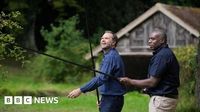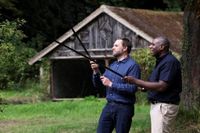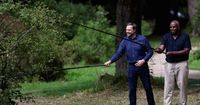It was a quintessentially English scene: two high-profile politicians, rods in hand, standing by the placid waters of a private lake on a summer’s day. But what began as a diplomatic gesture between Britain and the United States quickly turned into a minor embarrassment for the UK’s top diplomat, Foreign Secretary David Lammy, after it emerged he had gone fishing with US Vice President JD Vance—without the legally required licence.
The fishing trip took place on Friday, August 8, 2025, at Chevening House, the Foreign Secretary’s grace-and-favour residence in the lush countryside of Kent. JD Vance, in the UK for both official talks and a family holiday, joined Lammy for a spot of carp fishing before heading off to the Cotswolds with his wife and children. The event was part of a diplomatic engagement, but the day’s lighthearted spirit soon gave way to scrutiny when it was revealed that Lammy had not obtained the necessary rod fishing licence, a legal requirement for anglers aged 13 and over in England and Wales—even on private land, as clarified by Reuters.
The oversight, described by Lammy as an “administrative error,” could have landed him with a fine of up to £2,500. According to the Environment Agency, which oversees fishing regulations in the UK, failing to have a valid licence is a prosecutable offense regardless of whether any fish are caught. As it happened, Lammy’s luck was out: he caught nothing that day. JD Vance’s children, however, were more successful, much to the vice president’s amusement. “Unfortunately, the one strain on the special relationship is that all of my kids caught fish, but the foreign secretary did not,” Vance quipped to reporters, a moment captured by several media outlets including BBC, Sky News, and PA Media.
All fish that were caught during the outing were returned to the private lake, in accordance with standard angling practice. The lighthearted tone of the event, however, did not obscure the legal misstep. Once the error came to light, Lammy took immediate action. As reported by The Independent and Sky News, he wrote to the Environment Agency, notified them of the oversight, and promptly purchased the appropriate rod fishing licence. A Foreign Office spokesperson explained, “The Foreign Secretary has written to the Environment Agency over an administrative oversight that meant the appropriate licences had not been acquired for fishing on a private lake as part of a diplomatic engagement at Chevening House last week.” The spokesperson added, “As soon as the Foreign Secretary was made aware of the administrative error, he successfully purchased the relevant rod fishing licences.”
Lammy’s swift response was not just about rectifying a personal mistake—it was also a gesture towards transparency and accountability at a time when public trust in politicians can feel precarious. The Foreign Office further stated that Lammy’s letter to the Environment Agency “demonstrated how it would be rectified, and thanked them for their work protecting Britain’s fisheries.”
The Environment Agency, for its part, acknowledged the correction. “Everyone who goes fishing needs a licence to help improve our rivers, lakes and the sport anglers love,” said a spokesperson, as quoted by PA Media. “We understand the relevant licences have been purchased.” The agency did not comment on whether Lammy would face an actual fine, noting only that “all cases are carefully considered on their individual merits before any final enforcement decision is made.” According to the BBC, fishing without a licence can also result in the seizure of equipment, though there is no indication this occurred in Lammy’s case.
The episode has shone a spotlight on the UK’s fishing regulations, which require anyone aged 13 or over to obtain a rod licence to fish for freshwater species such as carp. Junior licences, for children aged 13 to 16, are free, while a one-day licence starts at £7.30 and an annual licence at £24.50. Enforcement is taken seriously: earlier this year, the Environment Agency fined six anglers £2,182 collectively for fishing illegally in London. “We inspect rod licences 24/7, 7 days a week to check on cases of illegal fishing, and for those caught cheating the system, we will always prosecute,” Richard Tyner, the agency’s area fisheries team leader, told the BBC in February. “Illegal fishing undermines the Environment Agency’s efforts to protect fish stocks and make fishing sustainable.”
While Lammy’s error was swiftly addressed, the incident has prompted wider discussion about the responsibilities of public officials and the symbolism of diplomatic gestures. The fishing trip itself was intended as a friendly, informal prelude to more serious bilateral talks between the UK and US. According to The Independent, the two men discussed international affairs, including the situation in Gaza, against the bucolic backdrop of Chevening’s grounds. Vance, despite having criticized the British government’s approach to free speech in the past, described Lammy as a “good friend” and a “very, very gracious host.”
It remains unclear whether JD Vance or his family obtained the necessary fishing licences for their part in the outing. The BBC reported that it had asked Vance’s spokesperson for comment but had not received an answer. The Foreign Office spokesperson, when questioned by Reuters, also declined to comment on whether a licence had been purchased for Vance. Regardless, the spotlight has remained firmly on Lammy, whose proactive approach to the error has drawn both scrutiny and some measure of respect.
For Lammy, the episode is a reminder that even the most routine aspects of British life—like a day’s fishing—are governed by rules that apply to all, regardless of status. As the Environment Agency emphasized, these regulations are designed to protect fish stocks and ensure that angling remains a sustainable and enjoyable pastime for generations to come. The agency’s spokesperson summed it up: “Everyone who goes fishing needs a licence to help improve our rivers, lakes and the sport anglers love.”
In the end, this diplomatic fishing trip may be remembered less for the fish that got away and more for the lesson in accountability it provided. Even in the world of international politics, sometimes it’s the small things—a forgotten licence, a quick apology, a public correction—that make the biggest splash.



